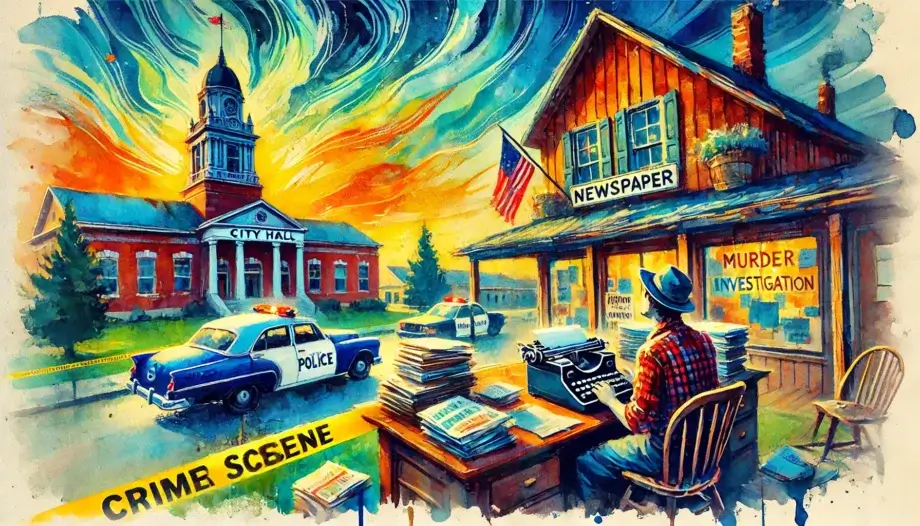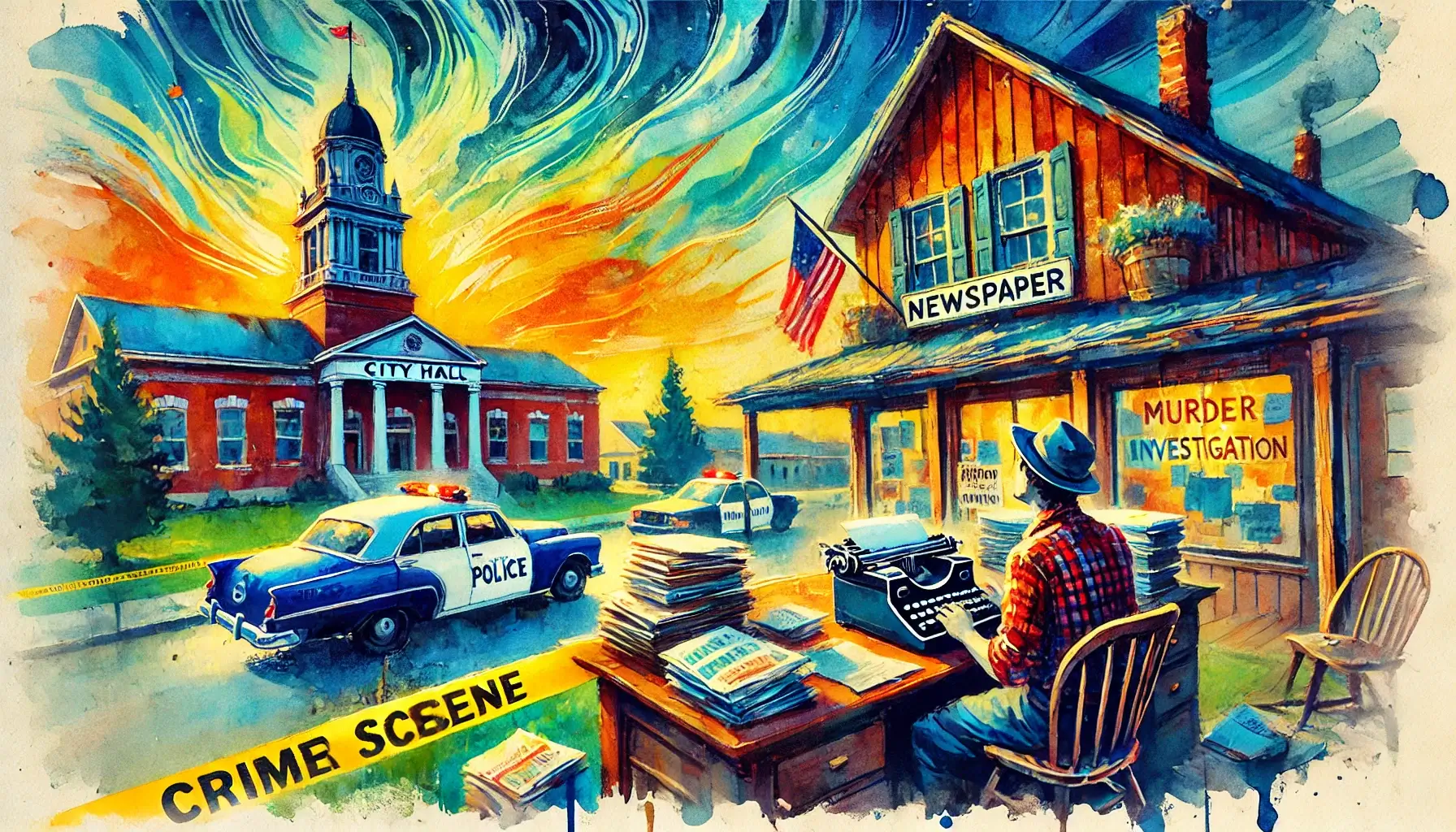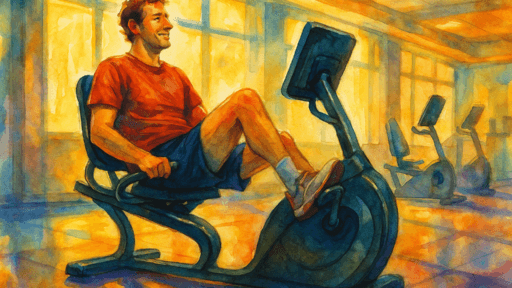“If we all said to people’s faces what we say behind one another’s backs, society would be impossible.”
Honoré de Balzac
The summer after my freshman year, I found myself back at my hometown paper, somehow covering both City Hall and Homicide.
It was a weird twist of fate, considering that during high school, I was the Sports guy—local baseball scores, high school basketball. I could rattle off stats faster than you could say “extra innings.” But due to a series of unusual events—probably involving budget cuts and someone’s questionable vacation scheduling—I was now the go-to reporter for murder investigations and municipal budget meetings.
The paper’s office was a relic of an era long past, complete with wood-paneled walls and that old-paper smell that clung to you like a permanent badge of honor. Every morning, I’d walk in feeling like I was bracing for either a budget debate or a murder scene—no middle ground. Would today be a quiet City Hall meeting, or would I get a call from the police station that had me rushing to the scene of a grisly crime? It was like flipping a coin, except both sides just said “Chaos?”—as if even the universe was half-hearted about the madness.
One of the people I ended up working closely with that summer was Rick. Rick was older, had seen it all, and had this permanent look on his face like he’d just smelled something slightly off. He was the kind of guy who could tell you everything about everyone—especially the things you had no business knowing. He was basically a human encyclopedia of small-town scandals, and, somehow, I had become his sounding board.
“Hey, Stephen, did you hear about Councilman Gomez? Heard his third wife’s filing for divorce,” Rick would say, never bothering to whisper.
I hadn’t heard. But Rick made sure I did—along with every other sordid detail. There was something oddly compelling about the way he relayed gossip. It felt like I was getting a VIP pass to the behind-the-scenes drama of small-town life. And honestly, when you’re covering dry City Hall meetings, a little intrigue is hard to resist.
Rick’s stories always started innocently enough—someone’s late to a council meeting or missed a zoning vote. But by the time he finished a story, half the town was starring in its own soap opera—complete with love triangles, backroom deals, and cover-ups that couldn’t fool a toddler.
I had to admit, it made the job more interesting, but it also made me realize something: Rick never had a good thing to say about anyone. Everyone, it seemed, was just waiting to reveal their worst selves.
One afternoon, Rick leaned back in his chair, hands behind his head like some kind of small-town oracle. “You know, Stephen, the mayor’s daughter just got into yoga. Can you believe that? Yoga. As if this town needs more people meditating when they should be solving their problems.”
I had no idea what Rick had against yoga, but there it was—a cornerstone of his “everything’s awful” philosophy. Every action, no matter how innocuous, had a sinister undertone. Yoga wasn’t about mindfulness; it was about avoiding responsibility. Divorce wasn’t just a relationship breakdown; it was evidence of deep moral failure. If cynicism were a mountain, Rick was already at the summit, waving me up to admire the wreckage.
Now, don’t get me wrong—I wasn’t above indulging in the occasional gossip session. Rick had a way of making it seem like you were in on something, part of the inner circle. But after a while, I realized that being in on it didn’t feel as good as it sounded. Each piece of gossip felt like another suitcase I didn’t pack but now had to lug around.
And here’s the thing: Rick didn’t just talk about the town council or the mayor’s daughter. He talked about me, too. “Stephen? He’ll crack like an egg under the pressure,” I overheard him telling someone once, as if I wasn’t just a few feet away. “He’ll be back to covering Little League by July.”
That’s when it hit me: gossip isn’t a one-way street. It’s more like a roundabout, where you’re just one exit away from becoming the subject of the conversation. Rick didn’t reserve his judgment for others; it was a full-time gig, and everyone was a potential target—including me.
The thing about gossip is that it tricks you into thinking you’re safe on the sidelines when really, you’re next in line.
So, I started tuning out Rick’s daily updates. I stopped engaging with his running commentary on the moral failings of the mayor’s family or the supposed backstabbing at the PTA. Instead, I tried something new: I looked for reasons to say something good about the people around me.
Sure, maybe Councilman Gomez’s voting record wasn’t flawless, but at least he could explain the budget in a way that didn’t require an accounting degree.
And the mayor’s daughter got into yoga? Honestly, that was probably the most productive thing anyone had done around here.
It wasn’t easy at first. Encouragement is the broccoli of conversation—good for you but nowhere near as satisfying as a double cheeseburger of criticism. But the more I practiced it, the lighter I felt.
Turns out, lifting people up doesn’t just brighten their day; it lightens yours, too.
And, let’s be honest, none of us really want to end up like Rick—perpetually annoyed at the world, convinced that everyone is just one yoga class away from total moral collapse.
So, here’s my challenge to you: the next time you’re tempted to lean into a juicy piece of gossip, pause. Ask yourself if there’s something kind you could say instead. It might feel awkward at first, like you’re trading in a sure thing for an untested strategy, but I promise you, it’s worth it. Encouragement is the long game, the one that makes you feel lighter, freer, and a lot less like you’re schlepping someone else’s dirty laundry through town.
And who knows? Maybe, just maybe, you’ll inspire someone else to do the same. Even Rick.






